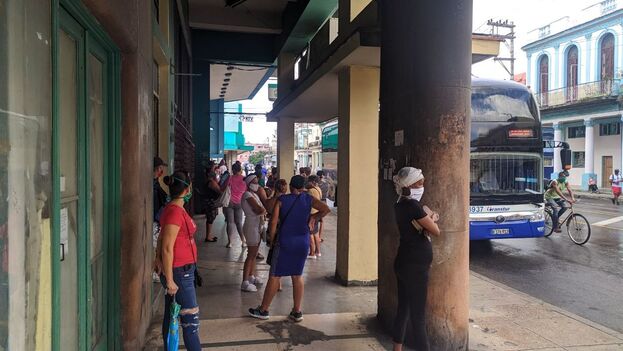
![]() 14ymedio, Yoani Sanchez, Havana, 15 June 2020 — On television they say that Cuba is heading towards reopening, a curious word for a country with so many political borders and so many economic dams. “If they say it, they will know something,” says a neighbor who, by dint of passing needs, now entrusts his hopes in “we can only get out of this hole, we can no longer fall any further.”
14ymedio, Yoani Sanchez, Havana, 15 June 2020 — On television they say that Cuba is heading towards reopening, a curious word for a country with so many political borders and so many economic dams. “If they say it, they will know something,” says a neighbor who, by dint of passing needs, now entrusts his hopes in “we can only get out of this hole, we can no longer fall any further.”
A few days ago they announced that we will soon be in phase one of the de-escalation and I feel that an eternity has passed since the first case of Covid-19 on the Island.
Although the pandemic continues to haunt our lives, most of the people I meet on the street have already put an end to any type of confinement and the sidewalks of my neighborhood are once again full of neighbors who come and go looking for some food to buy. The nearby Rancho Boyeros Avenue, which in the first weeks after the suspension of public transport, was deserted, now roars from early on with vehicle traffic, many with the sign “Vía libre – Coronavirus,” which allows those vehicles to travel anywhere, any time, regardless of restrictions that apply to others.
Although the Ministry of Public Health has released low numbers for the Covid-19 contagion in recent days, Cubans intuit that beyond the disease, the peak of the economic crisis is yet to come. September, with thousands of students returning to schools, seems to be the time when the needs curve will escalate. After months without tourism, with difficulties in traveling from one province to another, with many private businesses operating at half-capacity, and even the informal market hard-bit, that first day of school will be a challenge for many families.
“If right now I had to pay 10 CUC (roughly $10 US) for a package of detergent, how much will it cost when people have to wash their children’s uniforms every day?” reflects a friend who advises me to prepare for “the hardest summer of the last two decades.” Even the announcement that national tourism will be restored and that, perhaps with the drop in the arrival of foreigners, Cubans can access cheaper recreational offers, does not excite my friend. “Who can think of going to a hotel to spend what little money they have?”
Contrasts also arise. A friend who lives in Batabanó has called me to tell me that he has been practically eating “lobsters and shrimp” for several days because from his fishing village in southern Havana, which has traditionally fed shellfish to the black market in the capital, merchants who now can’t distribute the product due to the cuts in transport and to the reinforcement of the vigilance on the highways. “There is no rice, no soap, no oil, but there is no lack of lobster,” he says ironically.
Although such delicacies could be seen as a sign of luxury on a Cuban table, my friend knows that his current abundance is a bad sign. “This town lives on this because we supply not only Havana, but also all the private restaurants and the private houses in Viñales, Soroa and the tourist areas of Artemisa, Pinar del Río and Mayabeque,” he adds. “If in those places the economy sinks, here we’ll be buried.”
It is curious that in many of the phrases I hear, it is perceived as if life had taken the form of a line that sinks when access to resources, well-being or hopes is dealt with and dramatically rises when measuring crisis, scarcity and uncertainty. A sharp curve that, to flatten it, requires bold and urgent decisions that the ruling party, however, delays.
My friend has made a decision. “As soon as they open, I’m leaving, I’m not going through a second Special Period here.” In the countdown to escape are thousands of Cubans right now, standing another line, the one that separates them from the outside.
________________________
COLLABORATE WITH OUR WORK: The 14ymedio team is committed to practicing serious journalism that reflects Cuba’s reality in all its depth. Thank you for joining us on this long journey. We invite you to continue supporting us by becoming a member of 14ymedio now. Together we can continue transforming journalism in Cuba.
